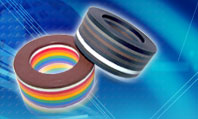Is Teflon safe?
About this topics, many scientists have many different conclusion. If you have a time, please read this article below, maybe you will know more about the teflon ptfe.
Teflon, invented by global chemical giant DuPont in the 1930s, became as much a symbol of kitchen convenience as cling wrap and the food processor.
But Teflon could be coming to a sticky end - because the manufacturing process uses a chemical that potentially causes cancer, and the US Environmental Protection Agency (EPA) wants the use of this chemical phased out.
The chemical - called perfluorooctanoic acid, or PFOA - is used to make compounds called fluoropolymers, which are used in turn to make Teflon and other products like oil and water-repellent coatings on carpet, textiles, leather and paper.
It's known that PFOA is widespread in the blood of the general population (though in low concentrations), where it stays for up to 10 years before being eliminated. In laboratory animals, PFOA has been shown cause cancer, liver damage, growth defects, immune-system damage and death. There isn't direct evidence that it's harmful to humans.
Last month though, an EPA advisory board of 17 scientists unanimously recommended PFOA be labelled a 'likely carcinogen' (a carcinogen is a cancer-causing substance) in humans.
The EPA asked DuPont, and seven other companies that use PFOA in manufacturing processes, to phase out its use. DuPont has agreed to take steps to make sure that by the year 2015, the chemical would not be released into the environment from its manufacturing plants, though it has not agreed to stop using it, or to stop making Teflon. The problem for Dupont is, as it stands now, it cannot make Teflon without this chemical, though it says it is looking for a substitute.
Indeed, there are some indications that the company has known for some time that PFOA is dangerous, but kept using it.
In 2004, DuPont paid US$300 million as an out-of-court settlement to around 50,000 residents who lived near its West Virginia plant and who brought a class action against the company, claiming it was responsible for contaminating local water supplies with PFOA, causing birth defects and other health hazards. The company settled without admitting liability.
Following this, in 2005, the EPA fined DuPont a total of US$16.5 million after finding the company had known for over two decades that PFOA is harmful, and kept quiet about it.
Should I throw out my non-stick fry pan?
When it comes to the non-stick products themselves though, DuPont says there is no risk to consumers. PFOA, says the company, is used the in the manufacturing process but is driven out during that process. There is no PFOA left in the non-stick surface in the final product.
The EPA agrees. 'At the present time, EPA does not believe there is any reason for consumers to stop using any consumer or industrial related products that contain PFOA', says the EPA's website.
Nevertheless, non-stick fry pans can release toxins. At high temperatures Teflon is known to give off a cocktail of 15 types of toxic particles and gases, including trifluoroacetic acid (TFA) and phosgene. These chemicals are known to be poisonous to birds. And in humans they case headaches, chills, backache, and fever - a condition known as 'Teflon flu'.
DuPont admits this, but it says in humans the condition is reversible, and in any case it only occurs at high temperatures, not during normal cooking use.
This too is the accepted wisdom amongst consumer groups; in Australia, for example, in a November 2004 'road test' of non-stick frypans, the Australian Consumers' Association said:
'It's true that chemicals such as trifluoroacetic acid (TFA) can be given off by some coatings at extremely high temperatures. But it's unlikely to happen during normal cooking…Research hasn't indicated harmful long-term effects of TFA on people. At this stage there's no evidence that non-stick cooking poses a safety risk.'
About 80 per cent of non-stick kitchen utensils on sale in Australia use Teflon - the rest are made by other chemical companies using a similar process that involves PFOA. There are no Teflon manufacturing plants in Australia.
And, according to the Australian Government's industrial chemicals regulator, NICNAS:
'Based on information currently available, there is no risk to the health of consumers using non-stick cookware under normal cooking conditions.'
But the Environmental Working Group (EWG), an independent US non-profit consumer group, disputes this. It says that Teflon begins to deteriorate after the temperature of cookware reaches about 260°C (500°F), and begins to significantly decompose above 350°C (660°F). Cooking fats, oils and butter will begin to scorch and smoke at about 200°C (392°F), and meat is usually fried between 200-230°C (400-450°F), but hot spots in the pan can easily exceed this temperature.
Off-gassing can occur when a Teflon pan is left unattended. A Teflon pan can reach 383°C (721°F) in just five minutes heated on a conventional, electric stovetop, says the EWG.
Consumers to decide?
It's important to note that no Teflon product has been recalled in the US, Australia or anywhere else. As far as the regulating bodies are concerned, they're safe - as long as you don't let them overheat.
But the finding that a chemical in the production process has been identified as causing cancer, acknowledged by the company - together with the company's 'difficulties' with the EPA in the past - is likely to have an effect.
The problem for companies like DuPont is, consumers are increasingly punishing products in the marketplace that are seen to have a question mark over their safety, despite company assurances they're safe, even if they were once consumer staples. Think cigarettes, fast food, and sugar-enhanced breakfast cereals.
Here's our tip: expect to see rows of non-stick frypans in discount stores going cheap; and poached eggs - cooked in conventional stainless steel frypans - making a comeback.
|



